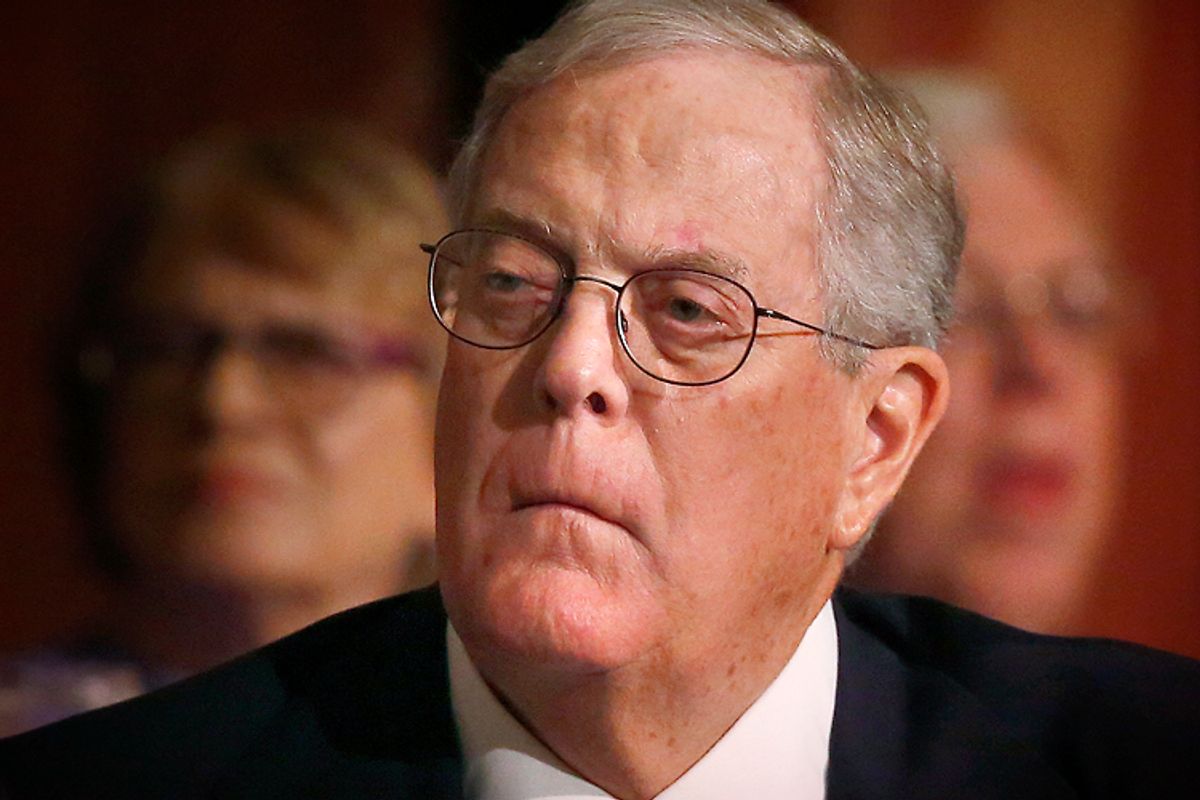A Koch-owned company will backtrack on restricting workers’ Facebook posts, under a settlement with the National Labor Relations Board. Under the December settlement, first reported by In These Times’ Mike Elk, Georgia Pacific – a paper company within Koch Industries - will post workplace notices announcing, “WE WILL repeal our Social Media Policy and WE WILL NOT issue policies that interfere with your right to share information relating to wages, hours and other terms and conditions of employment with others, including on social media sites.”
“The Koch brothers claim they believe in free speech and they want their employees to be involved in politics,” Association of Western Pulp & Paper Workers Union vice president Gregory Pallesen told Salon in an email. “However the Koch brothers only want that for themselves and for those who will abide by the Koch brothers’ own rules and regulations.” He added that the settlement “puts the Koch brothers on notice that they are not above the law when it comes to employee rights.”
As Elk reported, Georgia Pacific’s policy dated to 2011, and included a warning to employees that “Even if your social media conduct is outside of the workplace and/or non-work related, it must not reflect negatively on GP’s reputation, its product or its brands.” That sparked an NLRB charge from the AWPPW, which argued that the policy interfered with the collective action rights enshrined in New Deal law.
In an emailed statement, Georgia Pacific told Salon the company had “worked cooperatively” with the NLRB, and was “pleased that we were able to find a compromise that worked for both parties.”
The Koch case is one of a battery of social media disputes to face the Obama-era NLRB. As I’ve previously reported, while many Americans believe they have a “First Amendment right” to express themselves freely outside of work, the First Amendment only restricts the government from punishing employees’ speech. (And even there, there are limits: Last month the Kansas Board of Regents approved a politically and legally controversial new policy warning faculty could be fired for social media activity that “harms discipline by superiors or harmony among co-workers” or “adversely affects the university’s ability to efficiently provide services.”)
For the non-union, private sector majority of America’s workforce, even outside-work tweets or Facebook posts (or legal marijuana use, or volunteer work with AIDS patients) can be fireable offenses. “I find it really ironic,” AFL-CIO president Richard Trumka told me in 2012, “that the Supreme Court says that the federal government and the state government can’t do anything to regulate the free speech of corporations, but [corporations] can regulate absolutely the free speech of individuals.”
But there is a legal limit to firing workers over their tweets. While most U.S. employees lack an individual legal right not to be fired for free speech, the 1935 National Labor Relations Act includes a right to workplace collective action. And in a precedent-setting 2012 case, the NLRB found that the “protected concerted activities” under that law can include workers banding together through social media. Faced with five workers fired for a Facebook thread by the nonprofit Hispanics United of Buffalo, a 3-1 NLRB majority found that the employees had “made common cause” on the social networking site, and that “there should be no question that the activity engaged in by the five employees” was legally protected.
Not all social media activity is protected. As with face-to-face protest, what counts as protected collective action depends on a range of factors, including whether more than one workers was involved, whether the content was unacceptably offensive, and how directly it was tied to working conditions. When a car salesman contended he’d illegally been fired for complaining about cheap food served to customers that could hurt his commissions, the NLRB concluded he’d actually been fired for different Facebook posts, making light of an accident in which a teenager drove a Land Rover into a pond, and that the company was thus within its rights to sack him.
Along with Facebook-motivated firings, the NLRB has faced a series of cases like Georgia Pacific’s, in which workers challenged their companies’ social media policies on the grounds that as written they would discourage protected forms of collective action. Examples of social media policies found to be unlawfully broad, offered by the NLRB’s associate general counsel in a 2012 memo, included those that could “reasonably be interpreted as prohibiting employees from discussing and disclosing information regarding their own conditions of employment, as well as the conditions of employment of employees other than themselves …”
Tweeting and “liking” aren’t the only outside-work activities that Georgia Pacific has been accused of trying to control. In 2012, Elk reported that Georgia Pacific required that employees get permission between joining nonprofit boards or running for office, and sent its employees a voter packet identifying favored candidates and warning that if the wrong people won, “then many of our more than 50,000 U.S. employees and contractors may suffer the consequences, including higher gasoline prices, runaway inflation, and other ills.”



Shares